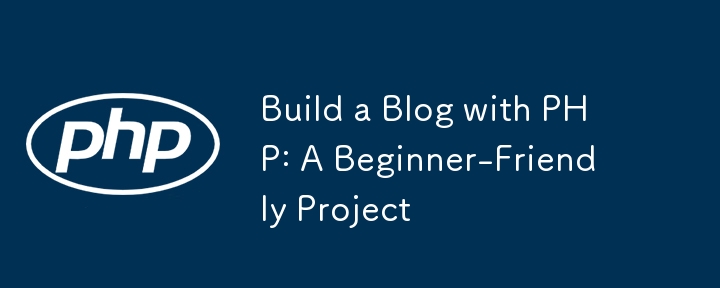
Build a Blog with PHP: Create your own blog site from scratch. First set up the PHP environment and MySQL database, and then establish the connection between the two. Then, build pages to display a list of blog posts and a single post page, which includes articles and comments. In order to create a custom blog, the basic tutorial can be extended to add custom styles, functionality, and social media integration. By mastering PHP basics and working with databases, you can create dynamic and interactive blogging projects.

Introduction
This tutorial will guide you through PHP Build a blog from scratch. We'll cover the basics like setting up a PHP environment, connecting to a database, and building the basic pages of your blog.
Prerequisites
Steps
1. Set up PHP environment
Install PHP and Composer (a package manager for managing PHP dependencies).
2. Create a database
Use SQL statements to create a database for storing blog posts and comments.
CREATE DATABASE blog; USE blog; CREATE TABLE articles ( id INT AUTO_INCREMENT PRIMARY KEY, title VARCHAR(255) NOT NULL, content TEXT NOT NULL, created_at TIMESTAMP DEFAULT CURRENT_TIMESTAMP ); CREATE TABLE comments ( id INT AUTO_INCREMENT PRIMARY KEY, article_id INT NOT NULL, name VARCHAR(255) NOT NULL, content TEXT NOT NULL, created_at TIMESTAMP DEFAULT CURRENT_TIMESTAMP );
3. Connect to the database
Establish a connection between PHP and the database.
$servername = "localhost";
$username = "root";
$password = "";
$dbname = "blog";
// 创建连接
$conn = new mysqli($servername, $username, $password, $dbname);
// 检查连接是否成功
if ($conn->connect_error) {
die("连接失败: " . $conn->connect_error);
}4. Create a blog post page
Build a page to display a list of blog posts.
// 获取所有文章
$sql = "SELECT * FROM articles";
$result = $conn->query($sql);
// 输出文章列表
while ($row = $result->fetch_assoc()) {
echo "<div class='article'>";
echo "<h1>" . $row['title'] . "</h1>";
echo "<p>" . $row['content'] . "</p>";
echo "<a href='article.php?id=" . $row['id'] . "'>Read More</a>";
echo "</div>";
}5. Create a single post page
Build a page to display a specific blog post and comments.
// 获取文章 ID
$id = $_GET['id'];
// 获取文章详细信息
$sql = "SELECT * FROM articles WHERE id = $id";
$result = $conn->query($sql);
$article = $result->fetch_assoc();
// 获取评论
$sql = "SELECT * FROM comments WHERE article_id = $id";
$result = $conn->query($sql);
$comments = $result->fetch_all(MYSQLI_ASSOC);
// 输出文章和评论
echo "<div class='article'>";
echo "<h1>" . $article['title'] . "</h1>";
echo "<p>" . $article['content'] . "</p>";
echo "<br>";
echo "<ul>";
foreach ($comments as $comment) {
echo "<li>" . $comment['name'] . ": " . $comment['content'] . "</li>";
}
echo "</ul>";
echo "</div>";Practical Example: Custom Blog
To create a custom blog, you can build on the basic tutorial:
Conclusion
This tutorial provides the steps to build a simple blog. By understanding PHP basics and working with databases, you can create dynamic and interactive blogging projects.
The above is the detailed content of Build a Blog with PHP: A Beginner-Friendly Project. For more information, please follow other related articles on the PHP Chinese website!




